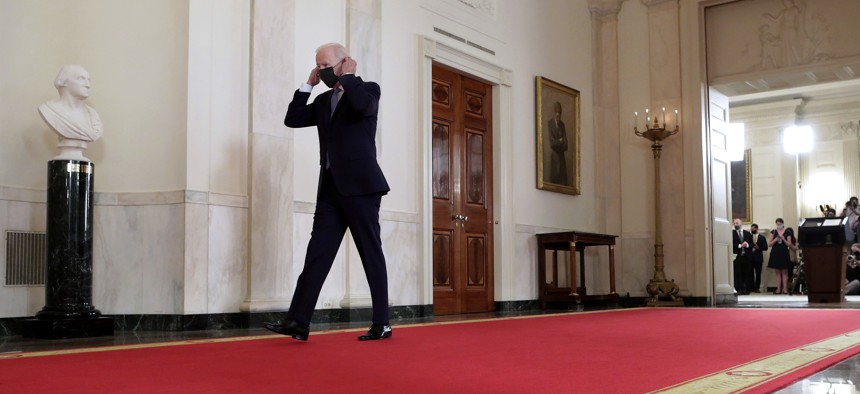
U.S. President Joe Biden replaces his face mask after delivering remarks on the end of the war in Afghanistan in the State Dining Room at the White House on August 31, 2021. Photo by Chip Somodevilla/Getty Images
The War on Terror—in Afghanistan and Elsewhere—Is Far from Over, Biden Says
The president vowed to continue counterterrorism efforts.
There are no more American troops on the ground in Afghanistan, but that doesn’t mean the war there is over.
Even though the war in Afghanistan formally ended on Monday, President Joe Biden committed to continue counterterrorism operations inside the country using capabilities based beyond its borders.
“We will maintain the fight against terrorism in Afghanistan and other countries. We just don’t need to fight a ground war to do it,” Biden said Tuesday during an address at the White House. “And to ISIS-K: We are not done with you yet,” he continued, referring to the Afghanistan-based affiliate of the Islamic State.
Al Qaeda planned the Sept. 11 attacks against the World Trade Center and the Pentagon from Afghanistan, where the mountainous, rugged terrain offers plentiful hiding places where terrorism can thrive. The United States invaded Afghanistan in 2001 to catch and kill those who were behind the attacks.
But even after 20 years of war, the risk of terrorism in Afghanistan is still high, as demonstrated by the suicide bombing outside the airport in Kabul last week that killed more than 100 people, including 13 U.S. troops. ISIS-K, an enemy of both the United States and Taliban which has previously clashed with the terrorist group for control of Afghanistan, claimed responsibility for the attack.
The Pentagon retaliated on Friday, conducting a drone strike to kill an ISIS-K planner in Afghanistan. The U.S. military announced a second drone strike on Sunday that blew up a vehicle loaded with explosives to eliminate “an imminent ISIS-K” threat to the airport, where evacuation operations were still ongoing.
Biden said these missions prove that the United States can control the terrorist threat using “over-the-horizon” capabilities, such as long-range aircraft or drones that allow the Pentagon to hit targets without personnel in the country.
“I firmly believe the best path to guard our safety and our security lies in a tough, unforgiving, targeted precise strategy that goes after terror where it is today, not where it was two decades ago,” Biden said.
But some are skeptical that the Pentagon can adequately track and respond to terror threats without boots on the ground.
“Probably 60 percent of a Reaper’s flying time now will be taken up just getting to and from Afghanistan if they’re launched out of bases in the Gulf states,” retired Gen. David Petraeus, the former CIA director, said at an Atlantic Council event in August.
Lawmakers in May grilled the administration on why it was withdrawing from Afghanistan without a plan to keep assets in the region in a neighboring country, something the Pentagon has still not publicly released. David Helvey, the acting assistant defense secretary for Indo-Pacific Security Affairs, testified that the withdrawal was not linked to efforts to work with other nations to base capabilities in what he acknowledged was “a very difficult neighborhood.”
The nations that border Afghanistan include Tajikistan, Turkmenistan, Uzbekistan, Iran, Pakistan, China, and a small stretch that’s disputed between India and Pakistan. Tensions between the United States and many of those countries make cooperation difficult.
There is also a carrier strike group in the Middle East that could be used if needed, Pentagon Press Secretary John Kirby said in July, though getting to landlocked Afghanistan would require flying over Iran or Pakistan.
Another option is to work with the Taliban to eliminate threats from the common enemy of ISIS-K, which will be an option if the new Afghan government makes good on commitments to allow for free travel out of Afghanistan and respect the rights of women and girls, Secretary of State Antony Blinken said Monday night.
“If we can work with the new Afghan government in a way that helps secure those interests...and protects the gains of the past two decades, we will do it,” he said. “But we will not do it on the basis of trust or faith. Every step we take will be based not on what a Taliban-led government says, but what it does to live up to its commitments.”
NEXT STORY: Inside the Final Hours at Kabul Airport







